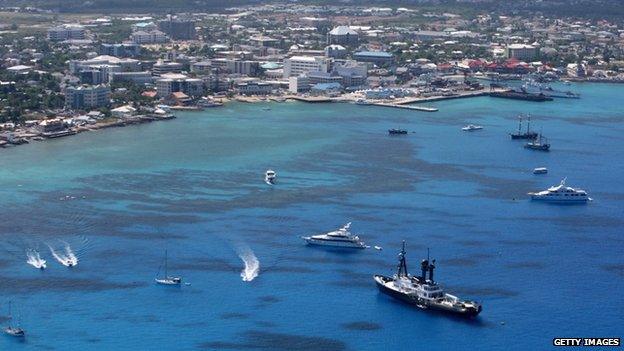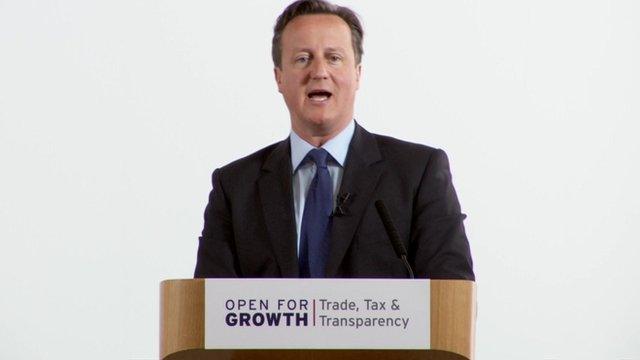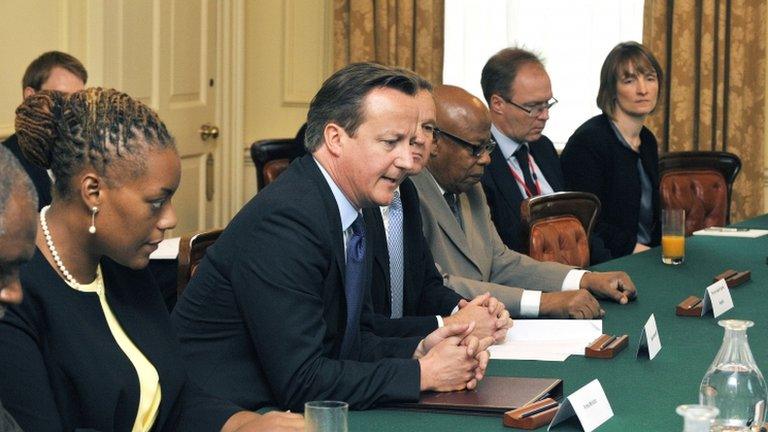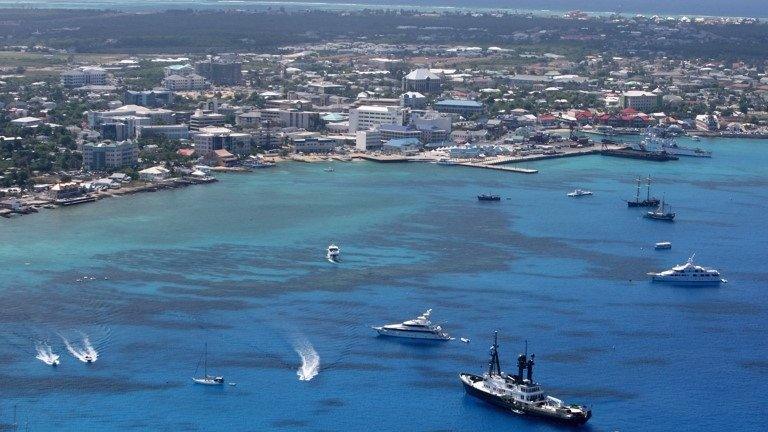Ed Miliband issues warning to UK-controlled 'tax havens'
- Published
- comments
Ed Miliband: Tax havens have "six months" to open up their books or face "international action"
A Labour government would push for UK overseas territories to be put on an international blacklist if they refuse to co-operate with a drive against tax avoidance, Ed Miliband has told them.
In a letter to their leaders, external, he said they would have six months to compile a public register of offshore companies.
If they failed, they could be put on a "tax havens" list and incur sanctions.
Conservative Treasury minister David Gauke criticised the plan, saying Mr Miliband did not understand the issue.
Mr Miliband told BBC News: "Billions of pounds are being lost in tax avoidance. Today we're serving notice on tax havens linked to Britain that they must open their books within six months of a Labour government, or face international action."
'Shrouded in darkness'
Mr Miliband's letter is being sent to British Overseas Territories - Anguilla, Bermuda, the British Virgin Islands, the Cayman Islands, the Turks and Caicos Islands, Gibraltar and Montserrat - and the Crown Dependencies of Jersey, Guernsey and the Isle of Man.
"If any Overseas Territory or Crown Dependency does not meet this deadline, we will ask the Organisation for Economic Co-operation and Development to put them on the OECD's tax haven blacklist," he said.
Leaders from the G20 - made up of 19 of the world's largest economies plus the European Union - have previously agreed to impose sanctions against jurisdictions on the OECD blacklist.

Analysis
By Chris Mason, political correspondent, BBC News
The premise of Labour's case is to plant an idea in our minds that there's a pot of silver going for the UK Treasury, if only the coalition tried harder. Labour cite research suggesting nearly £5bn a year is lost to the UK Exchequer from tax evasion in offshore financial centres.
It's a lot of money - if it's an accurate estimate - and money they are keen on. But getting to it is unlikely to be easy or quick.
First, the British Crown Dependencies and Overseas Territories are independent: the UK can't force them to do anything regarding taxation or financial regulation. There is a huge difference between tax evasion, which is illegal and tax avoidance, which is not.
"Blacklisting" is decided by international agreement, the UK can't demand it. We'll be starting an important international conversation and we'll drive through change, Labour says.
A senior government source on one of the islands concerned told me they'd had private meetings with Labour. Senior party figures, the source said, had struck a much more emollient tone then - and dismissed this as the public shouting of an election campaign.

The OECD's "list of uncooperative tax havens", external has been empty since 2009, though 38 jurisdictions are on a list of those "committed to improving, external transparency and establishing effective exchange of information in tax matters".
The territories and dependencies written to by Mr Miliband are all on that list.
Labour argues overseas territories and crown dependencies could help to stop or stem tax avoidance by showing tax authorities who is diverting money into companies there.

The Cayman Islands is one of the jurisdictions written to by Mr Miliband
In a speech to a Labour conference in Nottingham on Saturday, Mr Miliband said, external: "Over 18 months ago David Cameron promised to shine a light on tax havens linked to the UK. But the light hasn't come on. Their affairs are still shrouded in darkness."
"Britain is losing billions of pounds in lost revenue that could be invested in our future."
Mr Miliband also dismissed claims that Labour was anti-business, saying: "It's not pro-business to defend tax avoidance."
Ex-Cabinet minister Lord Mandelson backed Mr Miliband's stance on tax avoidance.
Speaking on Radio 4's Today programme, he said: "The truth is, we are seeing international companies developing new ways of gaming the [tax] system, of setting one regulatory authority against another."
Referring to Labour's recent spat with business leaders, including Boots boss Stefano Pessina over tax, Lord Mandelson said Labour had two months before the general election to show Mr Miliband can "make a case for business".
He said there was a "determination… to portray him [Mr Miliband] in a very negative way".
'Collapsed in chaos'
"People are going out of their way to pick up on every single stray word, to take out of context, and to portray him as basically anti-business."
"I don't think he [Mr Miliband] is against business - he is for good business practice. He is in favour of business responsibility, but then so is the vast bulk of business itself in favour of good business practice."
Conservative Treasury minister David Gauke said: "Ed Miliband's big idea has collapsed in chaos within hours of its announcement. He doesn't appear to understand that the UK is the only country in the OECD committed to a public central register.
"He wants the OECD to blacklist countries if they don't do the same as us. But that would mean blacklisting every single country in the OECD apart from the UK - countries like the US, France and Germany. Once again, it's clear that Ed Miliband is simply not up to the job."
At the G8 summit in June 2013 the prime minster announced an agreement between the UK's Overseas Territories and Crown Dependencies to sign up to a tax evasion clampdown.
The islands and outposts all agreed to sign up to the Multilateral Convention on Mutual Assistance in Tax Matters - an initiative led by the OECD.
They also agreed to publish national action plans on beneficial ownership, detailing the true owners of so-called "shell" companies.
So far none of the territories have followed the UK's lead in creating their own public central register, saying they will not make the change until there is international action.
- Published16 September 2014

- Published10 September 2013

- Published15 June 2013

- Published12 February 2014

- Published19 July 2013
